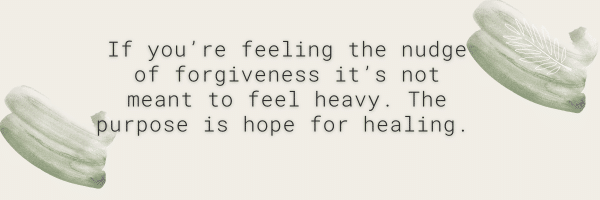Events that cause our resentment often stay unspoken for a few reasons (as well as others):
We are afraid of the unknown and conflict is the ultimate unknown. Before conflict is even on the table, we talk ourselves out of all the potential missteps before we get there. Like landmines, we often decide to avoid the risky mission altogether. Or for you, maybe you know the tendency to blow up in the face of escalation is inevitable. This pattern doesn’t lead to the outcome you ultimately want – forgiveness and freedom, so again the fallback solution becomes avoidance.
With forgiveness, there is an added layer of fears we tiptoe around that keep us stuck (Excerpt taken from my 15 page self-paced guide: Getting Started with Forgiveness). The question becomes, are these fears a myth or do they hold truth?
When it comes to communicating harm, these truths are glaring reminders that we have to address impact regardless of intention.
Here are a few examples of communicating forgiveness without excusing the hurtful behavior.
This array of examples displays the dance of impact and forgiveness. Impact without forgiveness breeds bitterness. Forgiving without communicating impact closes the opportunity for someone to learn about you and themself.
Here’s a simple structure to help you construct your impact forgiveness conversation:
When this happened… (action)
I felt… (impact)
Now I choose to… (extending your power of forgiveness)
In the future, when this happens, I will… (insert boundary if necessary and relevant)
Condensing the conversation into a formula and assuming the other person is a wonderful, compassionate listener is idealistic. In reality, these are the elements you will weave into a conversation that goes back and forth. This formula is for you. To help you put into words what you want to say so you feel prepared when it’s time to have the conversation.
One of my most memorable experiences was the night now stamped in my memory with the label: Forgiveness Abounds.
My daughter’s dad and I were talking after bedtime. He had come back into our lives consistently for about 6 months now and we were rebuilding a friendship. As we spoke, he started to ask questions about what it was like throughout all those years of parenting alone. My heart was stunned that he would ask. I had made an assumption that he didn’t realize the impact of his absence. A conversation that not too long ago would have opened the floodgates of bitterness now was an indicator that my forgiveness was secure.
I shared some of the hard in transparent honesty (see impact statement #1 above) – and more would come later. My calm tone and laid-back body language surprised him – he wanted me to yell and get mad, to reveal the mess of it all. But my heart wasn’t stuck there anymore. So filled with mercy and Holy Spirit tenderness, I said, “Matt, I’ve already forgiven you.”
Forgiveness brings freedom. It gives you a glimpse into how Jesus loves. Mercy is beyond our ability unless Jesus opens our eyes to compassion. There’s a story behind each act of harm that has nothing to do with that moment and everything to do with hidden pain. This is not to compare or justify the pain they caused, but in order to communicate forgiveness, genuine compassion must flow from the center.
The thing about forgiveness is that it doesn’t make sense. Holding a grudge, cutting someone out of your life, and treating them badly in return – that’s what we see most often. Dare I say what’s on all our minds: that’s what it feels like someone deserves. But extending grace? Phewf. That transforms the atmosphere of the room and the hearts in it. The night of our conversation he apologized for his absence. I cried. I felt free. I didn’t need an apology to forgive, I already had, but it sat in my soul like sunshine.
Yet, I wasn’t the only one who has “Forgiveness Abounds” stamped into their memory. To be forgiven? We all hope to be on the other end of radical forgiveness when we’re less than our best. It has the power to diminish shame.
Sharing the hard stuff AND extending forgiveness is a process we’re invited into more than we realize. Over and over with each newly uncovered wound, there’s an opportunity to acknowledge impact, forgive and let go. More often than not, the easy place to turn is to someone else to vent out our frustrations. The people in your life have immense influence over your path. Are the people shaping your trajectory pushing you toward resentment or forgiveness? Click “NEXT” below to read part 4 in this forgiveness series.
If your response was, “that’s me!” to anything above; you’re not alone. I’ve answered “yes” to every single statement. Hidden resentment makes us think we’re “over” something while creating this unseen wedge in a relationship that disintegrates intimacy.

